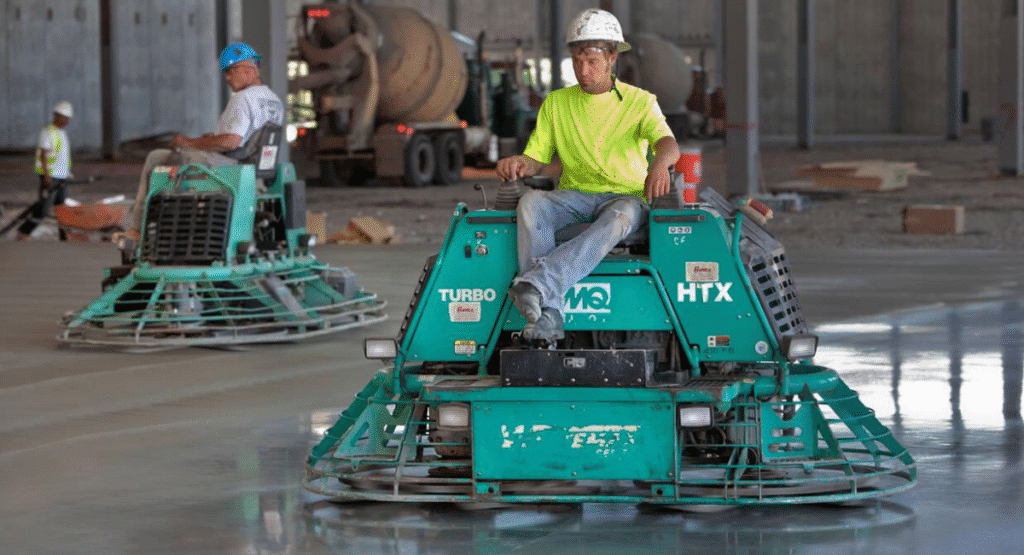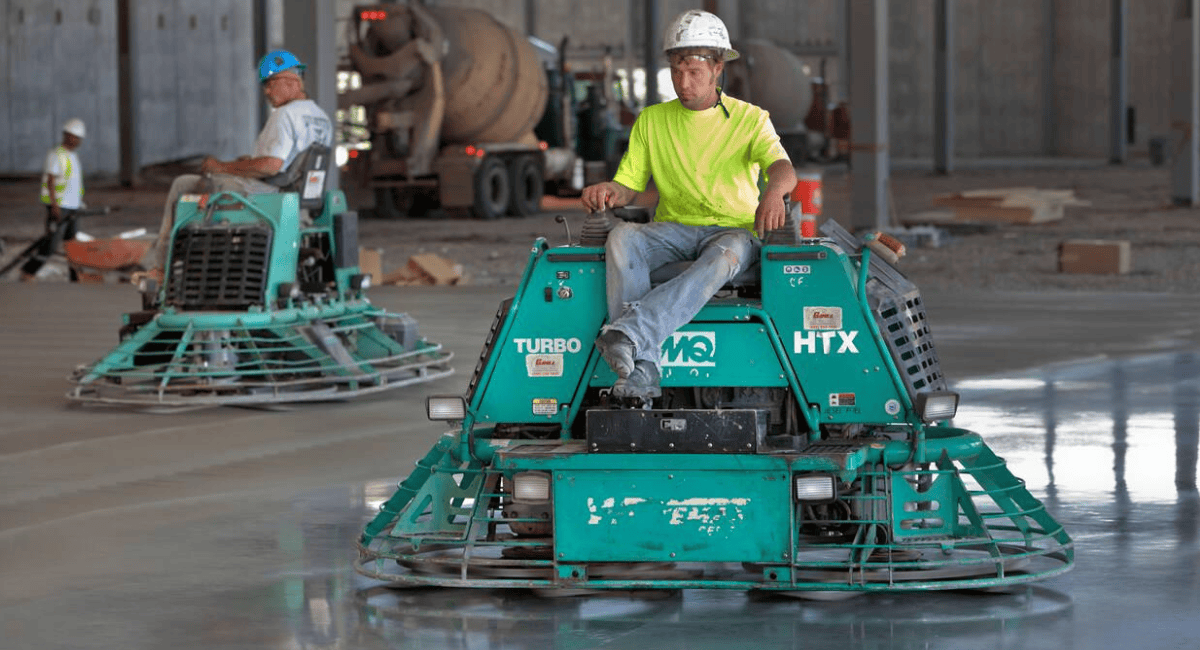Winter in Lansing hits hard. We’ve seen temperatures drop well below freezing, and those freeze-thaw cycles can wreak havoc on concrete surfaces. Over our years working with concrete driveways, patios, and sidewalks throughout the greater Lansing area, we’ve learned exactly what it takes to keep concrete strong through Michigan’s brutal winters.
The good news? With the right care and preparation, your concrete can withstand whatever winter throws at it. We’re sharing our top five tips based on real experience protecting concrete across Ingham County and beyond.
Understanding Winter’s Impact on Michigan Concrete
Before we dive into protection strategies, let’s talk about why winter is so tough on concrete here in Lansing. When water seeps into concrete and freezes, it expands by about 9%. That expansion creates pressure inside the concrete, leading to cracks, spalling, and surface damage. The cycle repeats itself dozens of times each winter as temperatures swing above and below freezing.

We see this damage every spring when homeowners call us about cracked driveways and deteriorating sidewalks. The concrete around Michigan State University campus, downtown Lansing, and neighborhoods like Old Town all face the same challenges. But the damage is preventable if you take action before winter arrives.
Tip 1: Seal Your Concrete Before the First Freeze
Sealing is your concrete’s first line of defense against winter damage. We recommend applying a high-quality concrete sealer every two to three years, ideally in late fall before temperatures drop. The sealer creates a protective barrier that prevents water from penetrating the surface.
Not all sealers are created equal for Michigan winters. Look for penetrating sealers specifically designed for freeze-thaw protection. We use products that meet or exceed industry standards for our climate zone, ensuring maximum protection for our clients’ concrete patios and other surfaces.
Apply sealer when temperatures are above 50°F and falling rain isn’t expected for at least 24 hours. This gives the sealer time to properly cure and bond with the concrete surface.
Tip 2: Choose the Right De-icing Products
Here’s something many Lansing homeowners don’t know: traditional rock salt can actually damage your concrete. Sodium chloride and other harsh de-icers cause surface scaling and accelerate deterioration. We’ve seen beautiful stamped concrete driveways ruined by improper de-icing products.
Instead, we recommend using calcium magnesium acetate or sand for traction. These alternatives are gentler on concrete while still providing the slip resistance you need during icy Michigan winters. If you must use salt, apply it sparingly and sweep away the residue once ice melts.
Never use de-icers on concrete less than one year old. New concrete needs time to fully cure before it can withstand the chemical exposure from de-icing products.
Tip 3: Address Cracks and Damage Before Winter Arrives
Small cracks become big problems when water freezes inside them. We always tell our customers that fall is the best time for repairs. Even hairline cracks can allow water infiltration that leads to significant damage over a single winter season.
Walk around your property and inspect all concrete surfaces carefully. Look at your concrete driveway, sidewalks, and patio areas for any signs of cracking or spalling. Pay special attention to areas where water tends to pool.
If you find damage, don’t wait. Our team offers concrete resurfacing services that can restore and protect your surfaces before winter weather causes further deterioration. Professional repairs done in fall will save you money compared to extensive spring repairs.
Tip 4: Manage Water Drainage and Snow Removal
Proper drainage is critical for winter concrete protection. Water that pools on or near concrete surfaces will freeze and cause damage. We make sure all our concrete installations have appropriate slopes and drainage, but existing surfaces sometimes need attention.
Check that downspouts direct water away from concrete surfaces. Clear leaves and debris from drainage areas around your driveway and walkways. Consider adding or improving drainage if you notice persistent water accumulation in certain spots around your Lansing property.
When snow arrives, remove it promptly but carefully. Use plastic shovels instead of metal ones to avoid scratching or gouging the concrete surface. Never pile snow directly against your concrete foundation, as repeated freeze-thaw cycles against the foundation can cause structural issues.
Tip 5: Consider Professional Winter Preparation Services
Sometimes the best investment is professional expertise. We offer comprehensive winter preparation services throughout our service areas in and around Lansing. Our team can assess your concrete’s condition, perform necessary repairs, apply professional-grade sealers, and ensure everything is ready for winter.
Commercial property owners particularly benefit from professional preparation. Commercial concrete surfaces face heavy traffic and liability concerns. We work with businesses throughout Lansing, East Lansing, and surrounding communities to keep their parking lots, walkways, and loading areas safe and damage-free all winter long.
Residential customers also appreciate the peace of mind that comes with professional preparation. We know Michigan winters, and we know concrete. That combination of local knowledge and technical expertise makes a real difference.
The Science Behind Freeze-Thaw Damage
Understanding why concrete fails in winter helps you protect it better. According to the Portland Cement Association, properly designed and maintained concrete can withstand hundreds of freeze-thaw cycles. However, saturated concrete exposed to freezing temperatures without protection will deteriorate rapidly.
The key word there is “saturated.” When concrete is protected from excessive moisture absorption through proper sealing and drainage, it handles freeze-thaw cycles much better. This is why our emphasis on sealing and water management is so important for Lansing’s climate.
The American Concrete Institute recommends air-entrained concrete for freeze-thaw resistance. Air entrainment creates microscopic air bubbles in the concrete that give water room to expand when it freezes. If you’re planning new concrete installations, make sure your contractor uses air-entrained mix for all exterior applications.
What to Watch for During Winter
Even with proper preparation, keep an eye on your concrete throughout winter. Look for surface scaling, which appears as flaking or peeling of the top layer. Watch for new cracks forming, especially after particularly harsh cold snaps.
If you notice water pooling in areas where it didn’t before, that could indicate settling or cracking beneath the surface. Don’t ignore these warning signs. Early intervention prevents minor issues from becoming major problems.
We’re always available to answer questions through our contact page. We’d rather help you address a small concern in winter than tackle extensive repairs in spring. Check our FAQs for answers to common winter concrete questions.
Spring Follow-Up Is Essential
When spring arrives in Lansing, inspect your concrete thoroughly. Look for any damage that occurred despite your preventive measures. Address repairs promptly before the summer sun further degrades damaged areas.
Spring is also when we schedule most of our resurfacing and repair projects. The ground has stabilized, temperatures are moderate, and there’s time for repairs to cure before the next winter. Don’t wait until fall when contractors are booked solid with other homeowners trying to prepare for the next winter season.
Trust Local Expertise
We’ve been protecting concrete through Lansing winters for years, and we know what works in our specific climate. Every region has unique challenges, and what works in warmer states won’t necessarily protect your concrete here in mid-Michigan. We understand the freeze-thaw cycles around Lansing, the typical winter weather patterns, and the specific demands placed on concrete in our area.
Our experience shows that proactive care makes all the difference. Homeowners who seal, repair, and protect their concrete before winter consistently see better long-term performance and lower overall maintenance costs.
Visit our about page to learn more about our commitment to quality concrete services in the Lansing area. We’re here to help you protect your investment year-round.
Take Action Now
Don’t wait until the first snowfall to think about concrete protection. If you haven’t sealed your surfaces this year, schedule that work now. Walk your property and identify any cracks or damage needing attention. Review your drainage and snow removal plans.
Winter concrete care in Michigan isn’t optional—it’s essential. With these five tips and professional support when needed, your concrete surfaces will survive Lansing winters and look great for decades to come. We’re ready to help with everything from inspections to complete resurfacing projects.
Protect your concrete now, and you’ll thank yourself when spring arrives without the expensive surprise of winter damage.
